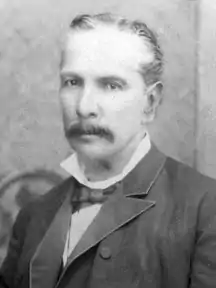Mariano Baptista
Mariano Baptista Caserta (16 July 1832 – 19 March 1907, Cochabamba) was a Bolivian politician who served as the 23rd President of Bolivia from 1892 to 1896 and as the 6th Vice President of Bolivia from 1884 to 1888. A member of the Conservative Party, he was renowned for his stirring oratorical style.
Mariano Baptista | |
|---|---|
 | |
| 23rd President of Bolivia | |
| In office 11 August 1892 – 19 August 1896 | |
| Vice President | Severo Fernández (1st) Vacant (2nd) |
| Preceded by | Aniceto Arce |
| Succeeded by | Severo Fernández |
| 6th Vice President of Bolivia | |
First Vice President | |
| In office 4 September 1884 – 15 August 1888 | |
| President | Gregorio Pacheco |
| Preceded by | Aniceto Arce |
| Succeeded by | José Manuel del Carpio |
| Foreign Minister of Bolivia | |
| In office 23 October 1888 – 25 January 1891 | |
| President | Aniceto Arce |
| Preceded by | Juan Francisco Velarde |
| Succeeded by | Serapio Reyes Ortiz |
| In office 9 May 1873 – 4 May 1876 | |
| President | Adolfo Ballivián Tomás Frías Ametller |
| Preceded by | Melchor Terrazas Virreira |
| Succeeded by | Jorge Oblitas |
| Personal details | |
| Born | Mariano Baptista Caserta 16 July 1832 Calchani, Ayopaya, Cochabamba, Bolivia |
| Died | 19 March 1907 (aged 74) Cochabamba, Bolivia |
| Nationality | Bolivian |
| Political party | Conservative |
| Alma mater | University of Saint Francis Xavier |
| Signature | |
Political career
President of Bolivia during the 1892-96 period and much more agreeable and less severe than his predecessor Aniceto Arce, Baptista vowed to open up the political process and decompress the climate of mutual mistrust between Liberals and Conservatives. To this end, he proclaimed amnesty and did his best to rule transparently and by the rule of law. However, popular fatigue with the Conservatives' successful efforts at replicating themselves in power eroded his support. His reputation took another serious blow when ex-President Hilarión Daza, who had decided to return to Bolivia from exile to explain his controversial actions during the War of the Pacific, was murdered by his own guards upon entering the country from Chile via railway. His murder was never explained, and no one was punished. Most Bolivians felt that Daza's presence (and willingness to talk) discomforted many old wartime leaders of Conservative persuasion (including Arce) and reopened barely healed wounds. In sum, Daza's murder was hung around Baptista like an albatross for the rest of his life. Meanwhile, the political climate continued to deteriorate, presaging the coming of the end of Conservative rule.
Still, some important international treaties were signed during the Baptista administration, especially with Argentina in regard to the Puna de Atacama, with Paraguay concerning the disputed Chaco region, and others with Brazil and Peru. Baptista was also involved in the signing of the first (preliminary) peace treaty ending the War of the Pacific. He retired from politics after the end of his term and died in 1907 at the age of 74.
References
External links
| Political offices | ||
|---|---|---|
| Preceded by Melchor Terrazas Virreira |
Foreign Minister of Bolivia 1873–1876 |
Succeeded by Jorge Oblitas |
| Preceded by Aniceto Arce |
Vice President of Bolivia First Vice President 1884–1888 Served alongside: Jorge Oblitas |
Succeeded by José Manuel del Carpio |
| Preceded by Juan Francisco Velarde |
Foreign Minister of Bolivia 1888–1891 |
Succeeded by Serapio Reyes Ortiz |
| Preceded by Aniceto Arce |
President of Bolivia 1892–1896 |
Succeeded by Severo Fernández |
